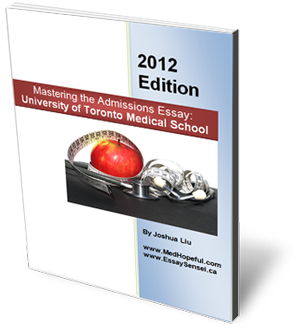
When I think back to where I was at this time last year, my world was pretty different. Not just my surroundings, but also inside as well – the thoughts, attitudes, beliefs, and feelings in my head. When it comes to medical school and my impending career, it was no different.
Medical education
Last year: I was fresh off finishing my first semester of medical school. That was without a doubt the most challenging semester of my life. Being thrown into anatomy physiology, histology and embryology with no prior knowledge or understanding made for some tough times. I remember going into some exams, and for the first time in my life, feeling that I could actually fail. Now while this feeling is common among medical students (yes, you have to know THAT much for exams here!), that doesn’t mean I enjoy it =).
This year: I have taken three major exams this year, and so far having received two of my exam marks back, I’m doing significantly better than last year. I think this is for a few reasons. One is that I think I much prefer this year’s material (more clinical and medically relevant) to last year’s (more basic anatomy and physiology). Second is that overall in my life I’m trying to work harder and be more productive, and that is rubbing off on my school work as well. Third I think is that I’m just better adjusted to medical school than last year. Overall this year I have felt a lot more confident going into exams. Now I just need to work on getting more sleep the night before the exam…
Medical career
Last year: Before I started medical school I thought I wanted to do neurology. By this time last year I was interested in cardiology. By the spring it was neurology again. Now it’s neither of those. There were also many others thoughts in between. As I watched a bunch of my friends start to make decisions and work towards residency (e.g. start doing research), I feared falling behind and not being a competitive applicant when I decided to apply to residency. I also had concerns about where I saw myself in medicine and I began asking myself lots of questions:
What kind of medicine do I want to practice? Will I be happy there? How much longer do I want to spend in school? What will the job market be like? How is the remuneration? What else do I want in life both inside and outside of medicine? How will the specialty fit in with my personal and career goals? Will I be able to achieve the balance in life I desire?
These are all questions I need to think about and reflect on, and there’s a good chance my answers to these questions will continue to change, and I need to be willing to adapt as my answers surely change. At this point last year, while I knew I needed to start answering these questions, my answers were still unclear. I’m sure this is partially why I wasn’t sure what I wanted to do in medicine. I did know that the closer I came to knowing myself and how I wanted to answer those questions, the easier I would be able to think about my future in medicine.
This year: One year later, I have a much firmer grasp on what I want in life and in medicine. I have spent a lot of time reflecting on what makes me happy now and what I think will make me happy years from now. I thought about where I envisioned myself in the future, both career wise and in my personal life. I’ve shared my thoughts, feelings, and ambitions with close friends and reflected on what they had to say. I thought about what makes me happy in medicine and what doesn’t. Over the past year, I have started to lean towards family medicine. My reasons for doing this are beyond the scope of this article (and personal to me), but suffice to say, it’s very much based on answering those questions I posed earlier. Could this change? Of course – I realize things could change, especially as I do my clerkship rotations, and nothing is certain until I actually apply for residency programs and get accepted.
Staying Busy
Last year: In my end of 1st semester reflection last year, I wrote: “I think this is the first Christmas break in a while where I haven’t really felt any stress or guilt whatsoever, and I guess most, if any of the stress, I’ve had previously was due to school.”
This year: Oh how things change! Right now, there is always work to do. I’m not super stressed, and I don’t need to work 24/7, but completely different from last year, there is always work that needs to be done. Of course, this is work that I’ve chosen to take on: research, projects, and so on. All that said, it feels good to be productive. Don’t worry, I will still be enjoying my holidays immensely =)
What is everyone else up to? What thoughts are occupying your mind this winter break? Feel free to share!







